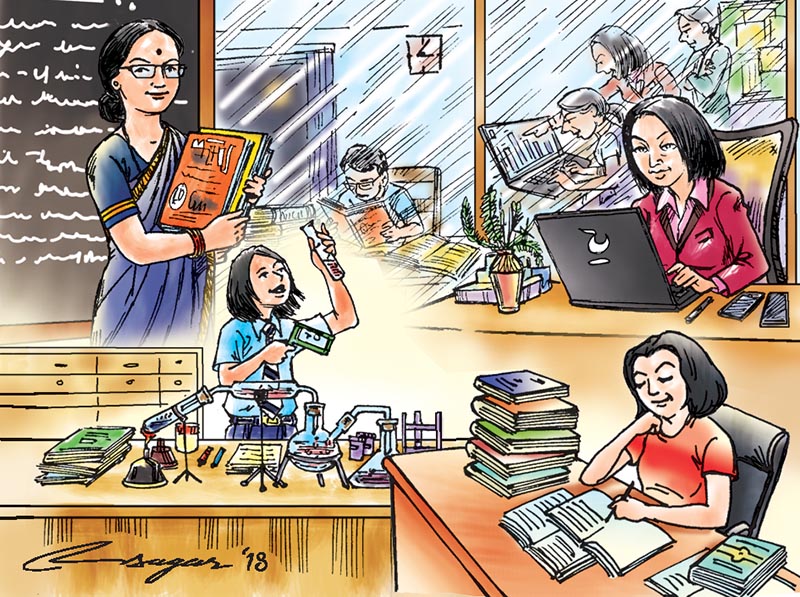Educate girls & women : For a prosperous community
Education is the key to bringing positive transformations in the lives of individuals, societies and nations. When we educate women, their community prospers, but if we deny them education, the world will suffer
“Education is the most powerful weapon which you can use to change the world,” said Nelson Mandela. Indeed, education is the key to bringing positive transformations in the lives of individuals, societies and nations. Education leads to better health, economic growth and peaceful and democratic societies.
Education serves as a driver for reducing poverty, eliminating gender inequality, creating a sustainable planet, preventing illnesses and fostering peace.
Girls and women in our country, especially those from underprivileged backgrounds, have not been able to realize their full potential for the lack of education.
“If you educate a man, you educate one person. If you educate a woman, you educate a nation.” It is an often heard quote. Yes, all of us know that boys and girls, men and women must be educated. But educating girls and women is even more effective because when we educate them, the benefits are felt across the community, nation and generations.
But in the name of educating girls, we in Nepal seem to have limited this to school enrolment. Statistics show drop-out rates among girls are higher than boys and then there are various reasons for this—some are easily addressable while others need policy intervention at the state level.
Educating girls should mean empowering them to realise their highest potential. Educated and empowered women can make huge contributions in achieving a nation’s sustainable development goal.
Education equips women with life skills that prepare them to cope with future challenges in different phases of life. Hence, government, as well as non-governmental organisations, must make education for girls a priority.
There are various social barriers than often keep girls off schools.
Girls face barriers to education because of poverty, cultural norms and practices, violence and poor infrastructure.
According to UNESCO estimates, 130 million girls between the age of 6 and 17 are school drop-outs and 15 million of them are of primary-school age. This is more prevalent among low-income families. Similarly, violence has negative impacts on access to education and safe environment for learning.
Girls from poor families cannot attend schools because they have to help their parents in the fields and household chores. In some communities there is still a lack of awareness about how education can empower girls, hence parents often force them to learn household chores rather than read books.
Lack of a safe environment in schools is also a major barrier. Some girls miss schools during their periods because schools lack proper toilets.
These may look small issues, but they are playing a crucial role in preventing girls from getting an education. Such social barriers must be broken. Girls’ education should be a priority to increase economic growth and human welfare.
It is important to educate every girl child through early childhood development (ECD). This gradually helps girls identify problems and solve them in the most efficient manner. In fact, ECD programmes help in the development of their intelligence quotient and emotional quotient. The focus should be on right education in a healthy environment.
It is crucial to know whether girls are getting safe-learning environment and adequate resources. They should be ensured with stronger schooling system with clear learning standards. They should be equipped with job-relevant skills that make them financially independent.
Women are the architect of the whole society. She builds home, establishes a family as an institution, brings up the children and makes them good citizens. They are committed towards their families, work and community. Ensuring proper access to education for girls lifts communities and nations out of poverty.
One of the areas our education system should immediately focus on is not only educating girls but also empowering them. And not only girls but also boys should be taught “women empowerment”, what it means and how it can bring transformative changes in families and communities, ultimately leading to a nation’s development.
Educating girls means ensuring that they feel safe while in school and complete all levels of education with skills to effectively compete in a competitive global marketplace.
Educating girls not contribute to achieving prosperity for the nation. Women make up half of the global population but when it comes to access to rights and justice, they still face several barriers. Educating them is the only way to break these barriers. Education is the only tool that can ensure gender equality.
How can a community or country succeed if only half of its citizens are educated? It is well-established fact that the achievement of economic growth is contingent upon the full use of the skills and qualification of women.
Education is the foundation of peace and prosperity. Education is the biggest investment.
Priya is lecturer of English at K&K International College






